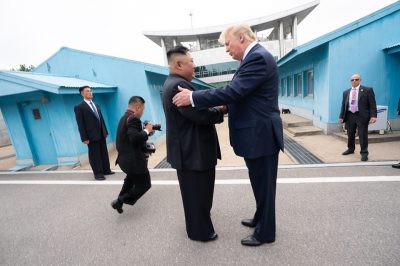The Trump-Kim Meeting: Mr. President, Your 20 Steps Into North Korea Toward Pyongyang Were Dramatic and Historical. But, “How Far Are You Going”?

[We repost this article by the late Prof. Joseph H. Chung, first published by GR in July 2019. Prof. Chung was an indefatigable voice on the politics of Asia-Pacific, especially on the dynamics of the Korean Peninsula.
This article is of timely significance amidst Trump’s election victory.]
The Trump-Kim meeting at DMZ on June 30 took the world off guard; it was theatrical; it was historical. It gave a glimpse of hope for long waited peace on the Korean peninsula and the falling-down of the last frontier of the unholy cold war.
Unfortunately, it seems that the media, think tanks and the political circles in the U.S. and elsewhere do not fully recognize the significance of the event.
I am asking two questions. What made the two world leaders to come to the meeting? What were the achievements of the meeting?
The objectives of the meeting can be different between Trump and Kim. We must remember how much Kim Jong-un was humiliated and angered by the failure of the Hanoi summit meeting in last February. We must remember that he took the one week-long painful train trip across China to show to the world how much he was sincere in solving the nuclear crisis.
But, he was betrayed by Trump. The Hanoi meeting has surely damaged his dignity, his pride and his leadership; he has lost his “face” in front of his people.
Since the Hanoi event, Kim had to do something to recover his leadership and find practical solutions to the nuclear issue and, at the same time, the problem of hunger and economic development.
He has taken some measures.
First, he has changed the negotiation team from the security team to the foreign affairs team possibly led by the first deputy minister of foreign affairs.
Second, this is important, Kim lost much of his faith in Washington; his mistrust about Trump, especially his advisors including John Bolton and Mike Pompeo has deepened.
Third, Kim might have abandoned the hope of freeing himself from never ending sanctions. It is possible that through the meetings with Xi Jinping and Putin, Kim has obtained the assurance for economic cooperation despite sanctions by Trump. In other words, Kim might have concluded that the relief from sanctions are not necessarily the first priority. This might have allowed Kim to meet Trump with a stronger bargaining position.
Fourth, Kim might have decided to focus, during the discussion with Trump on the preservation of his regime and national security. The regime preservation can be done through the establishment of liaison offices which will eventually become embassies.
It is likely to be easier for Trump to offer the regime preservation and security guarantee than the relief of sanctions for which the UN is involved.
If my assumptions regarding the sanctions and the regime preservation as well as security guarantee are correct, Kim might have come to DMZ without heavy burden; he might have come with a low level of hope. Therefore, he could be relatively easily satisfied with outcome of the meeting. In fact, after the 53-minute-chat with Trump, Kim looked pretty happy.
Fifth, it is important to know that it was not Kim who invited Trump; it was the latter who invited the former. This fact alone can contribute greatly the restoration of Kim’s dignity, his leadership and his “face” much tarnished in Hanoi.
In short, as far as Kim Jong-un was concerned, the DMZ meeting could offer decent rewards.
As for Trump, several factors seem to have led him to take the initiative for the meeting.
First, ever since the Hanoi event, Trump has not given up the hope for dialogue with Kim; in many occasions, he has been boasting about the good chemistry with Kim.
Second, he seems to regard the issue of North Korea differently from the Iran issue. Trump has taken much more belligerent approach to Iran, because Iran is capable of dominating the Middle East region, while North Korea has no capacity to dominate the region of East Asia. So, Trump could be more lenient toward Pyongyang.
Third, nuclear free North Korea could become friendly to the U.S. and it could be a part of China containment strategy.
Fourth, North Korea may be the true last economic frontier remaining in the region and the U.S. could participate, with ample benefits, in its economic development.
Fifth, owing to the devoted mediation of President Moon Jae-in of South Korea, the 70-year-old mutual mistrust between North Korea and the U.S. elite groups has been dissipated to some degree.
Sixth, the DMZ summit had the extraordinary timing to kill the huge impact of the second Democrats presidential election debate. The DMZ summit has completely eclipsed the media coverage of the Democrats debate. Thus, the summit was an important political gain for Trump.
Thus, both Trump and Kim had good reasons to come the summit meeting
Now, I am asking the question: “What are the summit’s accomplishments?” We may look at some possible positive results.
To begin with, the summit has proved that a summit could be organized with short notice, that it could take place with minimum cost and that it can take place often.
Moreover, the closed meeting of the two leaders lasted as long as 53 minutes, much longer than five minutes originally planned. Both Kim and Trump looked satisfied with the talk. Experts of Korean nuclear crisis suggest the following possible outcomes of the meeting.
First, Kim would have promised the dismantling of the Yongbyun nuclear facilities as well as missile launching pads. In exchange, Kim would have asked for his regime preservation and peace settlement. It appears that the relief of sanctions would have been given a lower priority.
Second, Trump might have accepted the “small deal” consisting of stepwise denuclearization in exchange of corresponding rewards by the U.S. That is, the Bolton’s idea of big deal could have been abandoned. By the way, Bolton was in Mongolia when the DMZ was taking place. This could mean a change in Trump’s strategy.
Third, it is true that the meeting did not produce concrete results; it is normal, because the meeting was not organized to produce them. The meeting was valuable in that it broke the stalemate of the nuclear dialogue and the reaffirmation of the mutual intention of continuing the dialogue.
On this point, the meeting was a success; new negotiation teams will be formed in a few week; the US team will be led by Stephen Biegun, US special representative for North Korea under Mike Pompeo, Secretary of State; the North Korea team could be led by Choe Son-hui, first deputy minister of foreign affairs under the direction of Ri Yong-ho, minister of foreign affairs.
Fourth, at the meeting, both leaders could have agreed to strengthen the top-down approach assisted by the bottom up consultations. It appears that the failure of the Hanoi summit was due to the lack of communication and coordination between the top and the bottom. It seems that now on, the top will more closely check the work of the negotiation teams.
Before closing my paper, I would like to add a few words about the reaction of media and politicians and brain-trust people. Most of these people are very negative about the meeting except Senator Bernie Sanders, leading Democrats president hopefuls and Pope Francis.
Their negative perception of the meeting is based on two main accusations, namely, the North Korea’s being not trustworthy and being a country of dictatorship.
As I pointed out in my previous Global Research papers, I am not sure which of the two countries is more untrustworthy. We must remember that the Framework Agreement of 1994 was broken by the U.S. and its allies, not by North Korea. In fact, if the U.S. and its allies respected the Agreement, North Korea would never have developed the nuclear weapons in the first place.
As for dictatorship, the history will tell you that the U.S. has supported countless terrible dictators all around the world. In South Korea, the U.S. has supported the merciless dictatorship of General Park Chung-hee and General Chun Doo-hwan. The argument that the U.S. would not deal with dictators is sheer hypocrisy.
The U.S. knew in advance that the government of General Chun would murder several hundred innocent citizens of Kwangju city on the 18th of May, 1980 with tanks and helicopters, yet the U.S. supported the criminals of the Chun government.
To sum up, I say this: I am glad that the DMZ summit took place. The FFVD (the Final Full Verifiable Denuclearization) is possible. But, Washington should abandon the “Big Deal” model and accept the stepwise denuclearization matched by relief of sanctions and other compensations leading eventually FFVD and lasting peace on the Korean peninsula. But the FFVD should guarantee North Korea’s self defence capacity.
However, to succeed in his attempt to denuclearize, Trump must free himself from the trap of demonization of North Korea perpetuated by the Washington Deep State oligarchy which goes for the maintenance of status quo of tension on the Korean peninsula so that they can sell more weapons to Korea.
*
Click the share button below to email/forward this article to your friends and colleagues. Follow us on Instagram and Twitter and subscribe to our Telegram Channel. Feel free to repost and share widely Global Research articles.
Don’t Miss Out on Global Research Online e-Books!
Dr. Joseph H. Chung is professor of economics at Quebec University in Montreal (UQAM). He is a Research Associate of the Centre for Research on Globalization (CRG).
Featured image is a White House photo
Can you help us keep up the work we do? If you have the means to make a small or large donation to contribute to our fight for truth, peace and justice around the world, your gesture will be much appreciated.


